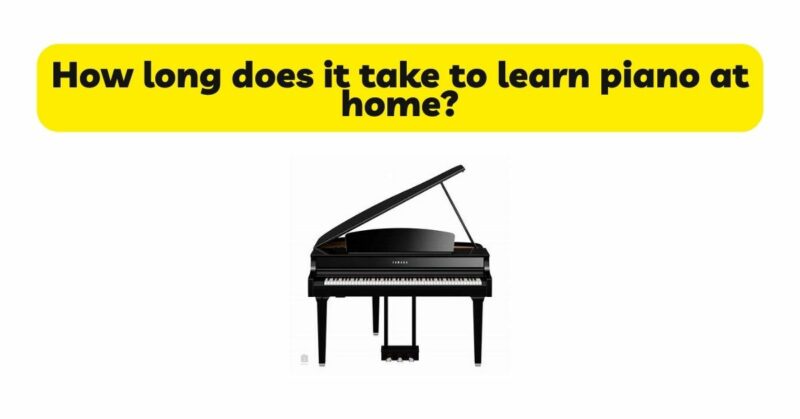The piano is an instrument that has captivated music enthusiasts for centuries. Its rich and versatile sound has made it a popular choice among those who wish to embark on a musical journey. With the advent of technology and the abundance of online resources, learning to play the piano from the comfort of one’s home has become increasingly accessible. However, the question that often arises is: how long does it take to learn piano at home? While there is no definitive answer, this article will explore various factors that influence the learning process and provide insights into what you can expect on your journey to mastering this majestic instrument.
- Setting Realistic Expectations: When beginning any new endeavor, it is essential to set realistic expectations. Learning the piano is a journey that requires dedication, patience, and consistent practice. The time it takes to become proficient at playing the piano depends on several factors, including prior musical experience, natural aptitude, available practice time, and the level of proficiency one wishes to achieve.
- Prior Musical Experience: Having prior musical experience can significantly impact the time it takes to learn piano at home. Individuals who have a background in music, such as playing another instrument or having knowledge of music theory, may find it easier to grasp the concepts and techniques involved in piano playing. Familiarity with musical notation, rhythm, and ear training can expedite the learning process.
- Natural Aptitude: While anyone can learn to play the piano, natural aptitude for music can play a role in how quickly one progresses. Some individuals may have an innate sense of rhythm, exceptional hand-eye coordination, or a good ear for pitch, which can facilitate their learning. However, even without natural aptitude, consistent practice and a structured learning approach can lead to significant progress.
- Practice Time: The amount of time dedicated to practice is crucial in learning the piano. Consistent and focused practice sessions yield better results compared to sporadic and inconsistent practice. While the specific duration can vary from person to person, experts recommend aiming for at least 30 minutes to an hour of daily practice for noticeable improvement. As one progresses, increasing the practice time can further enhance skill development.
- Learning Materials and Resources: In today’s digital age, a wealth of learning materials and resources is available to aspiring pianists. Online platforms, instructional videos, interactive tutorials, and virtual piano applications offer a myriad of options for self-study at home. Choosing high-quality resources that suit your learning style and goals can accelerate the learning process and provide structured guidance.
- The Role of a Teacher: While learning the piano at home is certainly possible, having a knowledgeable teacher can be immensely beneficial. A piano teacher can offer personalized guidance, correct technique, provide feedback, and tailor lessons to suit individual needs. Working with a teacher can enhance the learning experience, address specific challenges, and ensure proper progress.
- The Learning Curve: The learning curve for piano playing is not linear. Initially, beginners may experience rapid progress as they learn the basics and become familiar with the instrument. However, as one progresses to more advanced techniques and repertoire, the learning curve may flatten out, requiring more time and effort to achieve further growth. It is essential to remain patient and persistent during plateaus, as they are a natural part of the learning process.
- Setting Milestones and Goals: Setting milestones and goals can provide structure and motivation throughout the learning journey. Breaking down the learning process into smaller achievable goals, such as learning a particular piece or mastering a specific technique, can give a sense of accomplishment and keep the motivation alive. Celebrating these milestones can be encouraging and provide the impetus to continue learning.
Conclusion: Learning to play the piano at home is a rewarding and fulfilling endeavor that offers the flexibility of time and location. The time it takes to master this beautiful instrument varies for each individual and depends on various factors. Setting realistic expectations, dedicating ample practice time, utilizing high-quality learning resources, and potentially working with a teacher are all crucial elements in the learning process. Ultimately, with consistent effort, patience, and a love for music, one can embark on a fulfilling musical journey and make progress towards becoming a proficient pianist.


